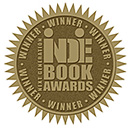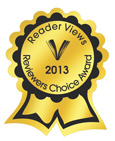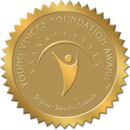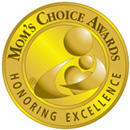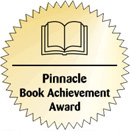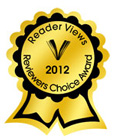 |
||||||||||||||||||
Book Reviews PajamaDaze.com
Similar to her first book, Critical Conditions: The Essential Hospital Guide to Get Your Loved One Out Alive, Martine Ehrenclou has written The Take-Charge Patient with the kind of authority and know-how that only someone who has experienced these challenges first-hand can achieve. The information is thorough, the tone comforting, and Ehrenclou’s straightforward suggestions make even the most daunting tasks—such as telling a long-time doctor you want a second opinion—seem doable. Divided into short, straightforward chapters, The Take-Charge Patient covers everything from understanding the doctor-patient relationship and getting the most out of each doctor visit to preventing medical errors and differentiating between types of procedures and care providers. Starting each section and woven in throughout are valuable first-person stories and advice shared by the more than two hundred patients and health professionals (including surgeons, family practitioners, registered nurses, medical assistants, and clinical professors) Ehrenclou interviewed. For anyone facing a complex diagnosis or condition in today’s increasingly complicated health world, The Take-Charge Patient is a valuable tool and guide with sound advice that won’t soon be outdated.
I would give it a ten if the scale went that high. However, since the scale only goes to five, I will have to settle for that. I was half way through this book when I had a relatively minor medical emergency. I had not even finished the books’ recommendations and I started using them. They worked. I am not recommending that you ignore half the book, but my personal experience is that if you take the book’s recommendations and use them, you will get better care. That is the intent of this book. In my personal case, I can verify that it succeeded. Each chapter ends with a list of specific action items in textbook fashion. This is a brilliant presentation. Read this book. Take its advice. It may save your life.
Aside from telling her own story of illness, powerlessness, frustration, empowerment and eventual recovery, Ms. Ehrenclou uses the majority of the pages of "The Take-Charge Patient" to offer her readers a relatively comprehensive and user-friendly guide to proactive self-advocacy when faced with illness, medical treatment, and medical providers who sometimes are less than thorough and less attentive to our unique situation than we would like. Although there are many lessons that I, myself, have taken away from "The Take-Charge Patient", one of the greatest lessons of all is to have in my possession a complete record of my medical history. Armed with information, the take-charge patient can walk into any doctor's office, coherently and intelligently outlining the highlights and issues that are most salient to the goal of that visit.
Tips to maximize the relationship with your doctor Here are a few suggestions that will help you make the most of your relationship with your doctor. They are for your benefit as a patient, because the more you know, the more empowered you will feel. Living Life as I See Fit Most patients do not participate in their healthcare as efficiently and as effectively as they could. I am referring to the relationship that patients have with their doctors rather than management of their health conditions. You will find that Martine’s book, The Take-Charge Patient, speaks to everyone regardless of whether you are fairly healthy or you live with a chronic condition. It also allows the reader to understand how to get past the frustration of limited answers by taking the time to acknowledge that we are partners in our healthcare with our medical providers. Leahs Good Reads
The Take Charge Patient is filled with valuable advice about managing your own healthcare or the healthcare of a loved one. Ehrenclou recommends and gives detailed instructions for creating a medical history, a medical journal, and a medical ID card. Each chapter gives am checklist that the informed patient can follow when approaching his or her physician. She covers primary care doctors, surgeons, specialists, hospitals, and urgent care facilities as well as handling medications and misdiagnoses. I thought the information here was invaluable. I look forward to having this as a resource for managing my healthcare. I give this one five stars for content. Read Feature Here... Justin's Hope Healthcare Blog The many check lists for patients placed strategically throughout the chapters makes it an easy to read and understand instruction manual, almost workbook, that could save your life and ease your anxiety while you’re facing illness. Her collaboration with both physicians and patients along with Martine’s own tragic and preventable healthcare experience gives the reader a real global picture of opinions, ideas and valid concerns that will help the reader become a better consumer. My first thought, being a mom and advocate for safer care, was that this book should be required reading for high school students. Start at the beginning. This basic healthcare knowledge along with conjoined courses on preventative care, finances, loans, budgets, exercise, safety, nutrition, support are what is needed in our schools to teach our children the basics before they go out on their own into an often chaotic world. Preparation is the key. Learning as you go can be dangerous. Useless mandatory courses should not trump the basics in education. This is also an excellent read for those suffering chronic conditions who feel lost in the poorly designed continuation of care model that is before us presently…although new models are emerging as we speak, we aren’t where we need to be yet with patient centered smooth transitions of care so patients must get involved and remain partners in their own care from now on. Do something for yourself and for your family and have them read this wonderful collaboration of best practices for patients based on common sense views and values with real time resources to guide you.
Her Circle Magazine Ehrenclou reminds readers that when visiting any other professional, we’d have records with us, a description of our situation and be ready participants to the remedy of the situation. She is right. If we seek our accountant for an issue, we bring W-2 forms, 1099s, prior tax returns, receipts and bank statements along with other paperwork. If we see an attorney about an issue, we make sure we also have whatever paperwork might support the case or provide evidence. We’re used to being in control of other situations, and we need to be as active in our healthcare as we are in other areas of life. In light of all the changes taking place through legislation of health insurance and health care, we must all be aware of and knowledgeable about what is and isn’t covered and what everything costs. Women typically take care of themselves last, and put their family’s needs before their own. We can be good role models to friends, children and our family members by being strong self-advocates in our own health care.
If one would be completely honest with oneself, I think most of us would admit to quite a few issues with the way we participate in our own healthcare. And no, I am not simply talking about taking better care of ourselves and doing “the right things,” but also about being proactive in any actions related to the healthcare we receive, or should receive. All too often we don’t give that enough thought, if any, and when disaster strikes, we are very ill equipped to deal with it, and its consequences. That’s why I believe that every American family should read and keep a copy of the excellent The Take-Charge Patient, the well researched and fantastically organized book by Martine Ehrenclou. This is one of those books in which the author truly makes you re-evaluate your involvement in the process, and while it is filled with information, it does not become boring or overwhelming at all. All of the information is very practical and explained in an approachable, easy-to-follow and easy-to-understand way. The personal stories from healthcare professionals, patients, and their “advocates” transform a simple “how-to” guide into something much more interesting and give the reader a look behind the scenes and into the inner workings of the health system.
Who is the one person who is most responsible for the quality of your health care? It’s not your doctor. It’s you. When you’re sick, really sick, you call the doctor. Then the average person trusts that the doctor has the correct diagnosis and then prescribes proper treatment to get you back to normal. This sounds fairly simple but in reality can be a complete nightmare, especially if the diagnosis is wrong and the prescription does not heal the real problem. What do you do then?
While writing this book, the author, Martine Ehrenclou, had developed a pain which became worse. She went to a variety of doctors which prescribed many different treatments, including surgeries. Eventually, after many painful challenges that were literally debilitating, she was able to have a correct diagnosis and was able to have surgery to solve the initial problem. These experiences ended up being the perfect guideline for her utilizing her own recommendations to this excellent resource.
The suggestions and information in The Take-Charge Patient are practical and realistic. The writing style is easy to understand and keeps the reading interested as each chapter continues. From the medical aspect, if you actually follow through with the author’s suggestion, any doctor should be thrilled about any patient being so involved with their care. The medical records sections are well-written and informative. Most people keep records for their pets. Why would it seem strange not to also keep your own medical records? Ms. Ehrenclou explains exactly what needs to be kept and the reasons for this. Her information on obtaining the best medical care is well-researched but should not be overwhelming for anyone, especially when the person who benefits the most from this is yourself. As I was reading The Take-Charge Patient, I felt that Martine Ehrenclou was singing to the choir but much of her book had new information that is helpful for everyone. Having a mother who did exactly what her doctor prescribed until it literally killed her and having a non-curable, but treatable disease, I am well aware of the medical profession, the expectations, the trust or lack of, the insurance companies, the pharmaceutical companies, are just some of the influences that can lead any doctor in a different direction. The author, Martine Ehrenclou has earned her Master’s Degree in psychology from Pepperdine University. She has worked as a journalist, ghostwritier, public relations professional, and facilitated a program for at-risk teenagers. Through her own experiences, now she works as an advocate for patients with her websites, The Take-Charge Patient and Critical Conditions. The Take-Charge Patient is a resource that should be available in every home, business, and medical facility. Reading The Take-Charge Patient is like being an observer at dozens of doctor's visits or conversations. The margins and footers are filled with quotes and tips from health professionals and patients. The table of contents is a great way to get started---find a chapter that applies to you and be ready with a highlighter, because there will definitely be some information you'll want to remember. You can download the first chapter to see just what I mean!
If you bring your car to the mechanic, you are equipped with information on what is wrong with your car, right? Approach meetings with physicians in the same way. Know something about your symptoms, about your medical condition, gather copies of your medical records (always keep a copy of them for yourself) and prepare for a meeting with your doctor. You make the most of the interaction that way, and you present yourself as a credible patient.
Preparation is key to patient confidence. It makes it easier to ask questions. Don’t let the doctor’s lack of time scare you off. This is your time, you are paying for it (health insurance or not) and you deserve to be treated respectfully and have your questions answered. Many physicians I interviewed said that it is important for patients to stay on track. Try not to bring into the conversation what your sister told you to do or what your friend’s doctor did for her. This is about increasing your credibility as a patient. Try to talk in a cognitive manner (less emotional) and you’ll find that doctors might respond and listen more carefully. Doctors are cognitive thinkers. This isn’t to say you can’t cry, act frustrated, depressed or whatever it is you are feeling—it just means you try to think about using strategies that help you get the most out of your office visit. Q: Do you think the failure to advocate for ourselves as patients is quite literally killing us? In what ways? Failure to advocate. Passive patients receive less than optimum care. If you do not interact with your medical provider, ask questions, works as a team player, educate yourself about your medical condition and your medications, you risk leaving a doctor’s office or hospital not knowing exactly what your diagnosis and treatment plan are. You put yourself at risk for being treated incorrectly, subjected to medical errors, poor communication and substandard care. Advocating for yourself takes guts. I won’t kid you. It’s not always easy. Enlist the support of a loved one to go with you to a medical appointment. Gather whatever it is you need to oversee and monitor your own care. This is your life we are talking about. 100,000 people die every year because of medical errors. 1.5 million people are harmed by medication errors every year. This is the easiest medical error to prevent. Participating in your medical care is simply essential now. Q: Sometimes it feels like dealing with chronic conditions is a full-time job. What are some ways we can manage our own care without going nuts in the process? I really understand how dealing with chronic conditions can feel like a full time job. At times, when I had my chronic pain condition, it felt like that to me. Do what you can to take charge of what you can for yourself as a patient. This reduces a sense of overwhelm and helplessness. It allows you to put the whole process aside at times, which is essential for not going nuts. Once you’ve done that, try to divert your attention elsewhere. That’s not easy to do, I know. But what helped me during my 16 months of chronic pain was to do my best to focus on my work, my husband and children. I watched movies. I tried to change my focus from my medical condition to something else that was positive. It didn’t always work and there were many times when I simply fell back with frustration, anger and fear. I spent a lot of time crying to my husband. It was not easy. But I believe what kept me from losing my mind was my refusal to give in completely to my medical condition. I stopped talking about it to most people. When people asked, “You still have the pelvic pain? Why haven’t you found an answer?” it made me feel worse and more afraid that I would never find the answer or be out of pain. So I stopped interacting with those people about my medical condition. I chose who I interacted with very carefully. I paid attention to how I felt with certain people. There’s nothing worse than well-meaning loved ones pummeling you with questions about your medical condition because they are anxious about it. Get an advocate. Find a loved one who is medically savvy and ask her/him to partner with you in your journey. Can she/he go with your to a couple of medical appointments? This takes some of the burden off of you and it helps to converse with someone after a medical appointment. I enlisted a good friend who was very medically savvy as my advocate. Find others who deal have your medical condition but look for people who are successfully dealing with it. It doesn’t mean you have to find someone who no longer has your condition, but it’s important to find people who are still managing their lives and living with the condition. This is about helping yourself. I found other pelvic pain patients who I could talk to but I was careful about interacting with people who were completely consumed with their medical condition at all times. Q: What’s the biggest misconception about patient advocacy, in your view? The biggest misconception about patient advocacy, in my opinion, is that patients or medical professionals view it as usurping the job of the medical professional. Not so. They are the experts, not us. Patient advocacy is about implementing strategies I’ve suggested in my books to support your doctors’ efforts not to replace them. But it’s also about educating yourself so you can decide for yourself if a treatment plan is right for you or if a diagnosis sounds right according to your research or second opinions with other physicains. Patient advocacy is about advocating for the patient but it’s also about being savvy with medical professionals and developing good communication skills so you can interact with them without stepping on their toes. You want collaboration and the way to get that is to diplomatically partner with your doctor. Many doctors are very open to this now because in the end an educated, empowered patient helps them too. But some still are not. If not, walk away. I met with two doctors who were not interested in a collaborative relationship with me as a patient. I walked away.
As soon as I saw the title of Martine Ehrenclou’s book I knew I had to read it. In "The Take-Charge Patient: How You Can Get the Best Medical Care" by Martine Ehrenclou we learn much about patients’ rights and how we can be our best advocate. She discusses a broad range of topics from how to find the right doctor or other health care professional and discounted medications to dealing with insurance companies. There is so much in this book that I can barely scratch the surface in a review.
This author, a patient advocate, does a fantastic job offering everyone who reads this book a chance to become their very own ‘protector.’ With interviews and ‘insider’ information collected from people in the healthcare community, she covers everything from how to choose the right doctor to how to untangle the twists and turns of medical insurance.
Splitting the book into easy to read, and, better yet, easy to understand, categories - readers first learn about the author’s own trials with the medical industry and how she used her skills and studies to become a ‘Take-Charge Patient.’ The book then takes the reader by the hand and leads them through the process carefully and intelligently. Ms. Ehrenclou has made sure to touch on all bases in order to help people feel better and safer about their medical care by taking charge of their own future.
This author, a patient advocate, does a fantastic job offering everyone who reads this book a chance to become their very own ‘protector.’ With interviews and ‘insider’ information collected from people in the healthcare community, she covers everything from how to choose the right doctor to how to untangle the twists and turns of medical insurance.
The Take-Charge Patient Book Review I have had the pleasure of meeting Martine Ehrenclou, author of The Take-Charge Patient. She is an incredible patient advocate, who also happens to be wickedly smart and intuitive. Martine’s efforts fall nothing short of excellent. You will find that The Take-Charge Patient speaks to everyone. Martine has essentially created a healthcare life vest and thrown it out there to help all of us. If you are wondering why some have sweet success in the healthcare arena while others are barely staying afloat, look no further. Easy to read (and guaranteed to be a better way to pass time than anything else in the waiting room) both are full of ways to help your doctors and nurses help you, whether or not you have a diagnosis. She offers tips for saving money, as well as suggestions for understanding and making good use of your insurance coverage. The tips within, are easy to employ.
The LL Book Review Midwest Book Review Living Life As I See Fit Blog - Lana Barhum Most patients do not participate in their healthcare as efficiently and as effectively as they could. I am referring to the relationship that patients have with their doctors rather than management of their health conditions. You will find that Martine’s book, The Take-Charge Patient, speaks to everyone regardless of whether you are fairly healthy or you live with a chronic condition. It also allows the reader to understand how to get past the frustration of limited answers by taking the time to acknowledge that we are partners in our healthcare with our medical providers.
See reviews of Martine's award winning Critical Conditions. |
Gold Winner Finalist Winner
Gold Winner Gold Winner Gold Winner Nautilus Silver Award in Health 2013
Winner of Best NonFiction Book of the Year, Readers Views, Reviewers Choice Award 2013
Winner (Gold) Best in Nonfiction Winner (Gold) Winner (Gold) Winner (Gold) Winner (Bronze) Book of the year in Health
Honorable Mention NABE Pinnacle Book 1st in Health
EDITORIAL REVIEWS SECTION “For anyone facing a complex diagnosis or condition in today’s increasingly complicated health world, The Take-Charge Patient is a valuable tool and guide with sound advice that won’t soon be outdated. Ehrenclou covers everything with the kind of authority and know-how only someone who has experienced these challenges first-hand can achieve. The information is thorough, the tone comforting, and straightforward suggestions make even the most daunting tasks seem doable.” (ForeWord Reviews) “Every American family should read and keep a copy of the excellent The Take-Charge Patient, the well researched, fantastically organized book by Martine Ehrenclou. A definite keeper, it is not boring or overwhelming, all of the information is very practical and explained in an approachable, easy-to-follow and understand way. It offers credible information, necessary for a solid foundation on which to make better healthcare decisions for ourselves and those we care about.” (Reader Views Reviews) “Ehrenclou has done a masterful job in thoroughly packing her book with extremely persuasive and useful advice about what it really means to take a proactive stance when it comes to your health. The text is precise, well-researched, reader friendly and enriched with compelling examples and anecdotes. Without doubt, this book will bring attention to the need to change our mindsets from being reactive to becoming proactive concerning our health care as it illustrates that your role as a healthcare consumer has never been more important than it is today. And understanding how to navigate the system will cut down on frustration, wasted time, energy, and delays in securing the best care.” (Book Pleasures) “An extremely well-written, well thought out and well put together book. Ehrenclou takes the reader by the hand and provides him/her with step-by-step instruction on how to become that so important “Take-Charge” patient – rather than having her readers become medical victims due to lack of knowledge and resources needed to take charge of their medical situations. Ehrenclou seems to have a true calling as a patient advocate for herself and those in the world around her... (Rebecca’s Reads) “…a treasure trove of useful information. Hailed by many in the medical community, this is an inside look at the way the medical system works and how to get the best medical care.” (BookViews) MORE REVIEWS “This book is amazing…should be in every household nationwide. Written so that any layperson can read and understand, broken down into steps to guide you through what you need to do – it is the best guidebook I have seen on the market to date.” (Fresh Reviews) “A necessity that will seriously help anyone and everyone who is tired, frustrated, and frightened with the medical care that they are receiving. The author, a patient advocate, does a fantastic job offering all who read this book a chance to become their very own ‘protector.’ Splitting the book into easy to read, easy to understand, categories, Ms. Ehrenclou has made sure to touch on all bases to help people feel better and safer about their medical care by taking charge of their own future. Becoming a “take-charge patient” and looking after your own health definitely begins by reading this informational and extremely helpful book!” (Feathered Quill Reviews) “A must-have for anyone wanting to increase the odds of getting the best treatment possible. Whether you are seeking a diagnosis, facing serious illness, or providing support for someone else, this easy-to-read book will provide invaluable help. Have this information close at hand…there are literally hundreds of valuable tips within.” (Deblog for Women)
|
||||
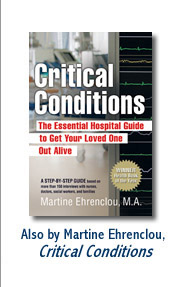
Home | Book Awards/Reviews | Published Articles | Testimonials | Events | Media Room | Resources | Contact
About the Book | About the Author | Buy the Book | Speaking
Copyright© 2019 Martine Ehrenclou. All Rights Reserved.
website design: guerrantwebworks.com
















